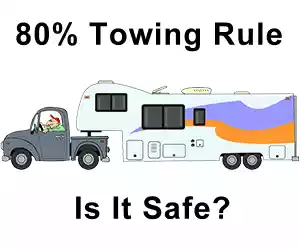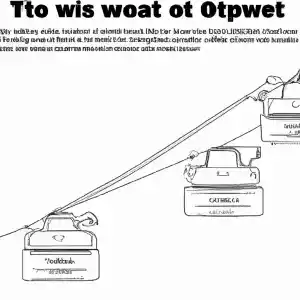Have you ever wondered what could possibly happen if a truck decides to haul more than it can handle? Well, hold on to your seats because we’re about to take you on a wild ride into the world of truck towing mishaps. In this eye-opening article, we will explore the potential consequences and dangers of overloading a truck and how it can lead to devastating outcomes. So, fasten your seatbelts and join us as we navigate through the potential hazards that await those who dare to tow too much.
Effects of Overloading on the Truck
Mechanical Stress on Vehicle Components
When a truck is overloaded, it puts excessive strain on its various mechanical components. The engine, transmission, brakes, suspension system, and other parts have to work harder to support the increased weight. This prolonged stress can lead to accelerated wear and tear, causing premature failure of these crucial components. As a result, the truck’s overall performance and reliability may be compromised, leading to costly repairs and potential breakdowns.
Reduced Stability and Control
Overloading a truck significantly reduces its stability and control on the road. The added weight alters the vehicle’s center of gravity, shifting it higher and further towards the rear. This change in balance makes the truck more prone to swaying, particularly during maneuvers such as cornering or sudden lane changes. Consequently, the driver may experience difficulty in maintaining control, increasing the risk of accidents and endangering both themselves and other road users.
Increased Stopping Distance
Overloading a truck also adversely affects its stopping distance. The additional weight amplifies the force applied during braking, requiring longer distances to come to a complete stop. This means that if a truck is overloaded, the driver needs to anticipate this increased stopping distance to avoid colliding with other vehicles or objects on the road. Failing to do so can result in rear-end collisions or other accidents due to the truck’s extended braking requirements.
Excessive Wear and Tear on Tires
Overloading a truck places excessive stress on its tires, causing accelerated wear and tear. The increased weight compresses the tires, generating greater friction between the rubber and the road surface. This friction, combined with the strain from supporting the extra load, leads to faster tread wear and tire deterioration. As a result, the tires become more susceptible to blowouts, reducing traction and jeopardizing the overall safety of the truck.
Impaired Steering and Handling
When a truck is overloaded, it becomes more challenging for the driver to maintain proper steering and handling control. The added weight amplifies the truck’s inertia, making it less responsive to steering inputs. This can make it more difficult to navigate corners, curves, and other driving maneuvers, potentially endangering everyone on the road. In extreme cases, overloading may even cause the truck to tip over during sharp turns, leading to severe accidents and injuries.
Effects of Overloading on Other Road Users
Decreased Maneuverability
Overloaded trucks have decreased maneuverability, making them more challenging to control. Their increased weight makes it harder for the driver to respond quickly to changing traffic dynamics or unexpected obstacles. This limited maneuverability can create hazardous situations for other road users, as the driver may struggle to make timely lane changes, merge safely, or react appropriately to emergency situations.
Increased Risk of Accidents
Overloading a truck significantly increases the risk of accidents for both the driver and other road users. The reduced stability, longer stopping distances, and impaired maneuverability mentioned earlier all contribute to this heightened risk. When a truck is overloaded, it becomes more difficult for the driver to operate the vehicle safely, increasing the likelihood of collisions, rollovers, and other dangerous incidents on the road.
Damaged Infrastructure
Overloaded trucks can also cause damage to roads, bridges, and other infrastructure. The excess weight places a substantial burden on the pavement, accelerating its deterioration and contributing to cracks, potholes, and fissures. Additionally, bridges and overpasses may suffer structural damage due to the increased stress exerted by overloaded trucks. These infrastructure damages not only pose risks to other road users but also result in significant repair costs for the authorities.
Environmental Impact
Overloaded trucks have a considerable environmental impact, leading to increased carbon emissions, air and noise pollution, and habitat destruction. The additional load requires more fuel consumption, releasing higher levels of greenhouse gases into the atmosphere. The engines of overloaded trucks may also produce more noise pollution due to the increased strain on the vehicle. Moreover, the additional weight can cause damage to vegetation and wildlife habitats adjacent to the roadways, disturbing natural ecosystems.

This image is property of cdn.hswstatic.com.
Legal Consequences
Fines and Penalties
Overloading a truck can lead to fines and penalties imposed by authorities. These fines typically vary depending on the degree of overloading and the specific regulations in place. In many jurisdictions, the fines increase as the extent of overloading becomes more severe. These penalties serve as deterrents to promote adherence to weight limits and ensure road safety for all users.
License Suspension
In certain cases, consistently overloading a truck can result in license suspension for the driver. This measure aims to prevent drivers from endangering themselves and others by repeatedly violating weight limits. License suspension serves as a temporary ban on driving privileges, urging drivers to comply with regulations and protect public safety.
Legal Liability for Damages
Overloading a truck can also lead to legal liability for damages caused by accidents. If an overloaded truck is involved in a collision, the driver and the trucking company may be held legally responsible for any injuries, property damage, or fatalities that occur. This legal liability reinforces the importance of adhering to weight limits and prioritizing road safety for everyone.
Insurance Implications
Overloading a truck can have negative consequences for insurance coverage. In the event of an accident, insurance companies may scrutinize the circumstances leading up to the incident. If it is determined that the truck was overloaded and that played a role in the accident, the insurance company may refuse to cover damages, leaving the truck driver or company liable for the full financial burden. Insurance companies expect their policyholders to operate within legal limits and take necessary precautions to minimize risks.
Economic Impact
Higher Fuel Consumption
Overloading a truck results in higher fuel consumption. The extra weight increases the truck’s resistance to motion, necessitating more engine power, and therefore more fuel, to maintain desired speeds. This increased fuel consumption leads to higher operating costs for trucking companies, ultimately reducing their profitability.
Increased Maintenance Expenses
Overloading a truck puts additional stress on its mechanical components, leading to increased maintenance expenses. The truck’s engine, transmission, brakes, and suspension system require more frequent inspections, repairs, and replacements due to accelerated wear and tear caused by overloading. These additional maintenance costs can significantly impact a trucking company’s budget, affecting its overall financial stability.
Premature Vehicle Failure
Overloading a truck accelerates the wear and tear on its various components, increasing the likelihood of premature vehicle failure. If a truck is consistently overloaded, its components may deteriorate at a faster rate than intended by the manufacturer. Premature failures can be costly, forcing trucking companies to invest in expensive repairs or even replace the vehicle entirely. These unexpected expenses can severely impact a company’s financial viability.
Lost Revenues
Overloading a truck can lead to lost revenues for trucking companies. The increased fuel consumption, higher maintenance costs, and potential vehicle failures mentioned above all contribute to decreased efficiency and productivity. Consequently, the company may not be able to maintain the same level of service or complete as many deliveries, resulting in lost business opportunities and reduced profits.

This image is property of s3.us-east-2.amazonaws.com.
Potential Damage to Cargo
Overstressed Packaging
Overloading a truck can cause damage to the cargo’s packaging. The excess weight can lead to compression, crushing, or deformation of the packages, compromising their structural integrity. Overstressed packaging increases the risk of product damage or loss during transportation, potentially leading to financial losses, customer dissatisfaction, and additional expenses associated with replacing or repairing the damaged goods.
Damage to Fragile Goods
Overloading a truck can pose a significant risk to fragile goods during transportation. The excessive weight and the resulting vibrations and impacts can cause fragile items to shift, collide, or become crushed. Delicate electronics, glassware, or other sensitive goods are particularly susceptible to breakage or irreparable damage. Ensuring compliance with weight limits is crucial to protect the integrity of the cargo and maintain high-quality standards.
Loss of Product Integrity
Overloading a truck may compromise the integrity of the transported products. Certain goods, such as perishable items or chemicals, require specific handling conditions to maintain their quality and safety. Overloading can put these goods at risk of exposure to unfavorable temperatures, pressure, or other detrimental influences. Such compromised product integrity can result in financial losses, regulatory violations, and reputational damage for both the trucking company and the customer.
Spoilage or Contamination
Overloading a truck can lead to spoilage or contamination of perishable goods or hazardous materials. When the cargo exceeds weight limits, the time required for transportation may be prolonged, increasing the risk of spoilage for perishable items. In the case of hazardous materials, overloading can lead to unintentional leaks or spills, posing threats to public health and the environment. Compliance with weight limits is crucial to prevent these potential risks and ensure the safe transportation of various goods.
Effects on Driver and Passenger Safety
Reduced Vision and Visibility
Overloading a truck can impair the driver’s vision and visibility on the road. The excessive weight can cause the truck’s suspension to compress, tilting the front of the vehicle upwards. This upward tilt can obstruct the driver’s line of sight, making it more challenging to see the road ahead, monitor traffic conditions, and identify potential hazards or pedestrians. Reduced vision and visibility increase the risk of accidents and compromise the safety of the driver, passengers, and other road users.
Higher Risk of Rollovers
Overloading a truck significantly increases the risk of rollovers, which are among the most severe types of accidents. The additional weight raises the truck’s center of gravity, making it more top-heavy and prone to tipping over during sharp turns or abrupt maneuvers. The consequences of a truck rollover can be catastrophic, resulting in severe injuries, fatalities, and extensive damage to other vehicles and objects in the vicinity.
Increased Braking Distance
Overloading a truck extends its braking distance, reducing the driver’s ability to stop the vehicle quickly in case of emergencies. The added weight increases the force required to brake effectively, resulting in longer stopping distances. This increased braking distance can be particularly dangerous when unexpected hazards or obstacles suddenly appear on the road. The driver must be aware of this extended stopping distance and adjust their driving accordingly to avoid potential collisions.
Inadequate Restraint System Performance
Overloading a truck can compromise the performance of its restraint systems, such as seatbelts and airbags. The excessive weight can exert additional pressure on these safety features, affecting their ability to function optimally during an accident. Inadequate performance of restraint systems increases the risk of severe injuries or fatalities for both the driver and passengers in the event of a collision. Adhering to weight limits is essential to ensure that all safety features provide the intended protection in case of an accident.
This image is property of qph.cf2.quoracdn.net.
Impact on Road Infrastructure
Pavement Damage and Deterioration
Overloaded trucks contribute to pavement damage and accelerated deterioration. The excessive weight places an immense burden on the road surface, causing increased cracking, potholes, and roughness. These damages necessitate frequent repairs and maintenance, leading to substantial costs for local authorities and ultimately affecting taxpayers. Overloading not only compromises the durability of the pavement but also disrupts the smooth driving experience for all road users.
Bridges and Overpasses at Risk
Overloading a truck can pose significant risks to bridges and overpasses. The extra weight places an excessive load on the structures, potentially causing structural damage or even collapse. Overloaded trucks should be particularly cautious when crossing bridges or overpasses with weight restrictions to ensure the safety and integrity of these vital transportation infrastructure components.
Increased Traffic Congestion
Overloaded trucks can contribute to increased traffic congestion on major roadways. These vehicles often operate at slower speeds due to the additional weight and reduced maneuverability. This slower pace disrupts the normal flow of traffic, leading to congestion, delays, and frustration for other road users. Minimizing overloading ensures smoother traffic flow and reduces the negative impact on overall transportation efficiency.
Higher Maintenance Costs
Overloaded trucks impose additional maintenance costs on road infrastructure. The excessive weight increases the stress exerted on the pavements, bridges, and overpasses, accelerating their deterioration and necessitating more frequent repairs and maintenance. These maintenance costs divert precious resources from other infrastructure projects and can strain the budgets of local authorities, affecting the quality and efficiency of the road network.
Environmental Consequences
Increased Carbon Emissions
Overloaded trucks contribute to increased carbon emissions, exacerbating climate change. The additional weight requires more fuel consumption, resulting in higher levels of greenhouse gas emissions, such as carbon dioxide and nitrogen oxides. These emissions directly contribute to air pollution and global warming, escalating the environmental impact of transportation. Adhering to weight limits reduces fuel consumption, lowers emissions, and promotes sustainability.
Air and Noise Pollution
Overloaded trucks not only emit more greenhouse gases but also generate increased air and noise pollution. The heavier load puts more strain on the truck’s engine, leading to louder noise emissions. Additionally, the additional weight increases tire friction and accelerates tire wear, resulting in the release of fine particulate matter into the air. These pollutants degrade air quality, potentially causing respiratory problems and other health issues for individuals living and working near roadways.
Habitat Destruction
Overloaded trucks contribute to habitat destruction, particularly when passing through environmentally sensitive areas. The excess weight can lead to soil compaction, vegetation damage, and habitat fragmentation along roadways. These adverse effects disrupt natural ecosystems, threaten wildlife habitats, and potentially contribute to the loss of biodiversity. Preserving weight limits and ensuring responsible transportation practices are essential for minimizing habitat destruction and protecting fragile ecosystems.

This image is property of fifthwheelst.com.
Preventive Measures
Regular Vehicle Inspections
Regular vehicle inspections are crucial in preventing overloading and its negative consequences. Trucking companies should implement rigorous inspection protocols to ensure that their vehicles comply with weight limits and are in optimal mechanical condition. These inspections should focus on assessing the weight distribution, suspension system, braking components, tires, and other critical aspects that can be compromised by overloading.
Monitoring Weight Limits
Monitoring and strictly adhering to weight limits is vital for preventing overloading. Trucking companies should implement effective monitoring systems that track the weight of their vehicles and cargo. This monitoring can be achieved through installed scales, load sensors, or a combination of technological solutions. By closely monitoring weight limits, trucking companies can proactively prevent overloading and mitigate potential risks.
Educating Drivers
Educating drivers about the importance of weight limits and the consequences of overloading is paramount. Comprehensive training programs should be implemented to ensure that drivers understand the potential hazards and legal implications associated with overloading. These programs should cover topics such as weight distribution, load securement, safe driving practices, and the importance of compliance with regulatory requirements.
Efficient Cargo Management
Efficient cargo management plays a significant role in preventing overloading. Proper planning, including assessing the weight and volume of the cargo, is crucial. By accurately calculating the weight of the cargo and ensuring it remains within legal limits, trucking companies can avoid overloading and maintain compliance with weight regulations. Implementing efficient cargo management practices also streamlines operations, reduces costs, and enhances overall productivity.
Importance of Compliance
Safety for All Road Users
Compliance with weight limits is crucial to ensuring the safety of all road users. Overloading a truck compromises stability, control, and braking performance, increasing the risk of accidents and injuries. By adhering to weight regulations, truck drivers and companies contribute to safer roads, protecting themselves and others on the highway.
Preservation of Roads and Infrastructure
Complying with weight limits helps preserve roads and infrastructure. Overloaded trucks put excessive stress on pavements, bridges, and overpasses, accelerating their deterioration. By respecting weight restrictions, trucking companies contribute to maintaining the quality and durability of road infrastructure, reducing the need for frequent repairs and minimizing the financial burden on taxpayers.
Safeguarding the Environment
Adhering to weight limits plays a significant role in safeguarding the environment. Overloaded trucks contribute to increased pollution, habitat destruction, and carbon emissions. By avoiding overloading, trucking companies help reduce their carbon footprint, minimize air and noise pollution, and protect fragile ecosystems along roadways. Responsible transportation practices contribute to a cleaner and more sustainable environment for future generations.
Legal and Financial Protection
Complying with weight limits provides legal and financial protection for truck drivers and companies. Failure to comply with regulations can lead to fines, penalties, license suspensions, and legal liabilities for damages caused by accidents. Additionally, insurance coverage may be compromised in the event of an accident related to overloading. By prioritizing compliance, trucking companies can protect themselves from legal and financial repercussions, ensuring long-term business sustainability.
In conclusion, overloading a truck can have numerous adverse effects on the vehicle itself, other road users, the environment, and even the trucking companies. From mechanical stress on vehicle components to potential damage to cargo, the consequences are far-reaching. Overloaded trucks result in decreased stability and maneuverability, increased risks of accidents and infrastructure damage, as well as negative economic and environmental impacts. Moreover, non-compliance with weight limits can lead to legal consequences, license suspension, legal liabilities, and insurance implications. By implementing preventive measures, such as regular vehicle inspections, strict monitoring of weight limits, driver education, and efficient cargo management, trucking companies can protect road users’ safety, preserve infrastructure, safeguard the environment, and ensure legal and financial protection. Overall, respecting weight limits is crucial for the well-being of all involved in the transportation industry and contributes to a safer, more sustainable future.

This image is property of ovr.com.au.


